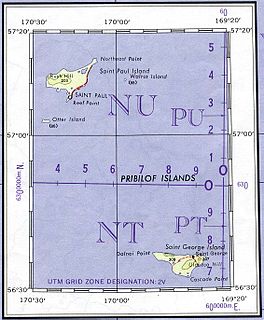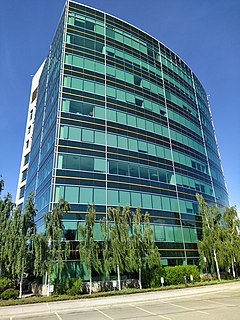Related Research Articles

The Aleuts are the indigenous people of the Aleutian Islands. In the Aleut language they are known by the endonyms Unangan and Unangas, both of which mean "people".
The Alaska Native Claims Settlement Act (ANCSA) was signed into law by President Richard Nixon on December 18, 1971, constituting at the time the largest land claims settlement in United States history. ANCSA was intended to resolve long-standing issues surrounding aboriginal land claims in Alaska, as well as to stimulate economic development throughout Alaska.

The Pribilof Islands are a group of four volcanic islands off the coast of mainland Alaska, in the Bering Sea, about 200 miles (320 km) north of Unalaska and 200 miles (320 km) southwest of Cape Newenham. The Siberian coast is roughly 500 miles (800 km) northwest. About 77 square miles (200 km2) in total area, they are mostly rocky and are covered with tundra, with a population of 572 as of the 2010 census.
The Alaska Native Regional Corporations were established in 1971 when the United States Congress passed the Alaska Native Claims Settlement Act (ANCSA) which settled land and financial claims made by the Alaska Natives and provided for the establishment of 13 regional corporations to administer those claims.
Ahtna, Incorporated is one of thirteen Alaska Native Regional Corporations created under the Alaska Native Claims Settlement Act of 1971 (ANCSA) in settlement of aboriginal land claims. Ahtna, Incorporated was incorporated in Alaska on June 23, 1972. Headquartered in Glennallen, Alaska, Ahtna is a for-profit corporation with more than 2,000 Alaska Native shareholders primarily of Ahtna Athabascan descent.
Calista Corporation is one of thirteen Alaska Native Regional Corporations created under the Alaska Native Claims Settlement Act of 1971 (ANCSA) in settlement of aboriginal land claims. Calista was incorporated in Alaska on June 12, 1972. Although the Calista region is in western Alaska, Calista Corporation is headquartered in Anchorage, Alaska. Calista is a for-profit corporation with 34,500 Alaska Native shareholders primarily of Yup'ik descent.

Sealaska Corporation is one of thirteen Alaska Native Regional Corporations created under the Alaska Native Claims Settlement Act of 1971 (ANCSA) in settlement of aboriginal land claims. Sealaska was incorporated in Alaska on June 16, 1972. Headquartered in Juneau, Alaska, Sealaska is a for-profit corporation with more than 23,000 Alaska Native shareholders primarily of Tlingit, Haida, and Tsimshian descent. In 1981 Sealaska Corporation sponsored the creation of the non-profit Sealaska Heritage Foundation, now the Sealaska Heritage Institute, which manages its cultural and educational programs. Sealaska’s primary economic drivers are natural resources, land management, environmental services and seafood.

NANA Regional Corporation, Inc. (NANA) is one of thirteen Alaska Native Regional Corporations created under the Alaska Native Claims Settlement Act of 1971 (ANCSA) in settlement of Alaska Native land claims. NANA was incorporated in Alaska on June 7, 1972. NANA is a for-profit corporation with a land base in the Kotzebue area in northwest Alaska. Its corporate office is in Kotzebue, Alaska. NANA's Alaska Native shareholders are of Inupiat descent.
The 13th Regional Corporation, is one of thirteen Alaska Native Regional Corporations created under the Alaska Native Claims Settlement Act of 1971 (ANCSA) in settlement of aboriginal land claims. It was incorporated in Alaska on December 31, 1975. The 13th Regional Corporation is a for-profit corporation presently headquartered in Seattle, Washington, with approximately 5,500 Alaska Native shareholders of Eskimo, American Indian, and Aleut descent. Its original enrollment was of Alaska Natives who were no longer resident in Alaska.

Southwest Alaska is a region of the U.S. state of Alaska. The area is not exactly defined by any governmental administrative region(s); nor does it always have a clear geographic boundary.

Arctic Slope Regional Corporation, or ASRC, is one of 13 Alaska Native Regional Corporations created under the Alaska Native Claims Settlement Act of 1971 (ANCSA) in settlement of aboriginal land claims. ASRC was incorporated in Alaska on June 22, 1972. Headquartered in Utqiaġvik, Alaska, with administrative offices in Anchorage, ASRC is a for-profit corporation with nearly 11,000 Alaska Native shareholders primarily of Inupiat Eskimo descent.
Bering Straits Native Corporation (BSNC) was formed in 1972 as the Alaska Native Claims Settlement Act (ANCSA) regional corporation for the Bering Straits and Norton Sound region. The corporation actively pursues responsible development of resources and other business opportunities. Through its subsidiaries, BSNC serves the federal government and commercial customers.
Bristol Bay Native Corporation, or BBNC, is one of thirteen Alaska Native Regional Corporations created under the Alaska Native Claims Settlement Act of 1971 (ANCSA) in settlement of aboriginal land claims. Bristol Bay Native Corporation was incorporated in Alaska on June 13, 1972. Headquartered in Anchorage, Alaska, Bristol Bay Native Corporation is a for-profit corporation with approximately 9,900 Alaska Native shareholders primarily of Eskimo, Aleut, and Indian descent. BBNC states its mission as “Enriching Our Native Way Of Life" as a corporation "that protects the past, present and future of the Natives from Bristol Bay.”
Chugach Alaska Corporation, or CAC, is one of thirteen Alaska Native Regional Corporations created under the Alaska Native Claims Settlement Act of 1971 (ANCSA) in settlement of aboriginal land claims. Chugach Alaska Corporation was incorporated in Alaska on June 23, 1972. Headquartered in Anchorage, Alaska, Chugach Alaska Corporation is a for-profit corporation with over 2,200 Alaska Native shareholders primarily of Chugach Alutiiq, Eyak, and Tlingit descent.
Cook Inlet Region, Inc. (CIRI) is one of thirteen Alaska Native regional corporations created under the Alaska Native Claims Settlement Act of 1971 (ANCSA) in settlement of aboriginal land claims. Cook Inlet Region, Inc. was incorporated in Alaska on June 8, 1972. Headquartered in Anchorage, Alaska, CIRI is a for-profit corporation, and is owned by more than 7,300 Alaska Native shareholders of Athabascan and Southeast Indian, Inupiat, Yup’ik, Alutiiq and Aleut descent.

Doyon, Limited, is one of thirteen Alaska Native Regional Corporations created under the Alaska Native Claims Settlement Act of 1971 (ANCSA) in settlement of aboriginal land claims. Doyon was incorporated in Alaska on June 26, 1972. Headquartered in Fairbanks, Alaska, Doyon is a for-profit corporation with about 18,000 Alaska Native shareholders primarily of Alaskan Athabaskan descent.
Koniag, Incorporated is one of thirteen Alaska Native Regional Corporations created under the Alaska Native Claims Settlement Act of 1971 (ANCSA) in settlement of aboriginal land claims. Koniag, Inc. was incorporated in Alaska on June 23, 1972. Headquartered in Kodiak, Alaska, with additional offices in Anchorage, Koniag is a for-profit corporation with about 3,400 Alaska Native shareholders primarily of Alutiiq descent.
Ukpeaġvik Iñupiat Corporation, or UIC, is one of about 200 Alaska Native village corporations created under the Alaska Native Claims Settlement Act of 1971 (ANCSA) in settlement of aboriginal land claims. Ukpeaġvik Iñupiat Corporation was incorporated in Alaska on April 19, 1973. Located in Utqiaġvik, Alaska, Ukpeaġvik Iñupiat Corporation is a for-profit corporation whose Alaska Native shareholders are primarily of Iñupiat Eskimo descent.

Andrew Gronholdt was a famous Aleut from Sand Point, Alaska, in the Shumagin Islands south of the lower Alaska Peninsula and became famous for rejuvenating the ancient Unangan art of carving hunting hats called chagudax. In January 2012, a book was published posthumously by Gronholdt titled "Chagudax: A Small Window into the Life of An Aleut Bentwood Hat Carver" Gronholdt's woodworking techniques, wood steaming and bending methods, and instructional design methodologies were legendary.
Emil Reynold Notti is an American engineer, indigenous activist, businessman, government employee, and political candidate of Koyukon Athabaskan heritage.
References
- Corporations database. The Aleut Corporation. Division of Corporations, Business & Professional Licensing, Alaska Department of Commerce, Community and Economic Development. Retrieved on 2007-03-18.
- The Aleut Corporation. (2007). Annual Report 2006 — The Aleut Corporation: Honoring Our Traditional Ways. Anchorage, AK: The Aleut Corporation. Retrieved on 2007-03-26.
